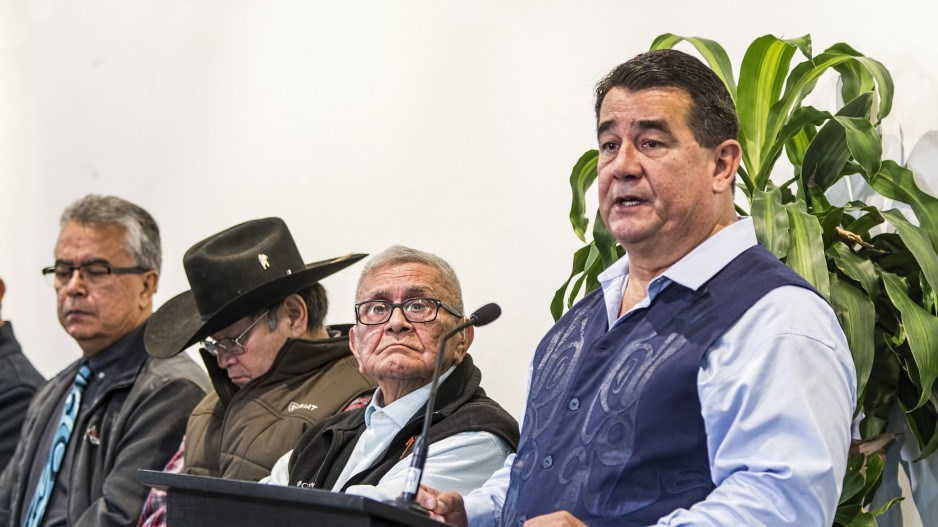The First Nation Wild Salmon Alliance is accusing Department of Fisheries and Oceans officials of “rewriting” Prime Minister Justin Trudeau’s fiat to phase out open net salmon farming in British Columbia.
The alliance held a press conference this morning in Vancouver to pressure the Trudeau government to stick with its plans to “transition” open-net salmon farms in B.C. – a transition that is being jeopardized by DFO officials, according to Bob Chamberlin, chairman of the First Nation Wild Salmon Alliance (FNWSA).
“We had this press conference to let the public know the fix is in and the consultation is a sham,” Chamberlin told BIV News.
Anti fish farm activists have been lobbying for a couple of decades now to have open-net salmon farms shut down, based on fears they pose a risk to wild salmon through disease transmission.
In 2019, fish farm opponents celebrated what they thought was a victory, when Trudeau wrote in a mandate letter to then-Fisheries and Oceans Minister Bernadette Jordan:
“Work with the province of British Columbia and Indigenous communities to create a responsible plan to transition from open net-pen salmon farming in coastal British Columbia waters by 2025 and begin work to introduce Canada’s first-ever Aquaculture Act.”
But as the 2025 deadline for a transition plan looms, a new federal Aquaculture Act is still nowhere in sight, and salmon farm opponents, which includes the majority of Coastal First Nations, are worried that, as a transition plan enters the final phase of consultation and development, DFO is “rewriting” the mandate in a way that will allow open-net salmon farms to continue to operate in B.C. past 2025.
Chamberlin’s members fear DFO officials are pushing the transition plan in a direction that would allow open-net salmon farms to continue to operate in B.C. waters.
“They’re reshaping it,” Chamberlin said of the original mandate to the fisheries minister. “They’ve decided that they know better than the prime minister. So we have a department that is not only undermining the minister, but rewriting the prime minister’s mandate.”
The Fisheries minister’s office has held a number of round tables on transition planning that included questions for stakeholders.
“They were buffalo jump questions is what the chiefs called them, because they were all leading to supporting the industry,” Chamberlin said.
Fish farm opponents want all open-net salmon farms off the water and put on land. The problem with that is that land-based salmon farms may simply not be economically viable in B.C. Also, some First Nations support fish farming and rely on the industry for jobs and own-source revenue.
The salmon farming industry has been promoting a compromise, including hybrid systems that would not entirely eliminate exposure to salmon farms, but would limit it, with things like semi-containment pens.
Chamberlin's members worry that DFO is open to that approach.
“What we’re seeing, in all communications from the transition planning process, is they say ‘we’re going to have stronger regulations to incentivize the transition,’” Chamberlin told BIV News. “That’s not a transition from – that’s status quo, with new regulations, new oversight and so forth. But it still means open-net pens operating.”
DFO is also entertaining issuing federal aquaculture licences for salmon farms for two to six years, Chamberlin said. There is a deadline of March 8 for commenting on the reissuing of licences.
Chamberlin said any federal licences should be reissued for only one year at a time until a final decision is made on the transition plan.
“If they’ve got a licence that’s for six years, and they’re going to get phased out now, the government has to consider financial exposure for termination of those licences," Chamberlin said.
Chamberlin said his organization is pushing for a meeting with the prime minister, as well as senior B.C. Liberal cabinet ministers and MPs Jonathan Wilkinson, Terry Beech and Joyce Murray to air their concerns about the way the federal salmon farm transition plan is going.
He said his group also would like to have meetings with Conservative Leader Pierre Poilievre and NDP Leader Jagmeet Singh.
In a written statement, Fisheries and Oceans Minister Diane Lebouthillier's office responded to the concerns raised by the FNWSA.
"Our government remains committed to work on a responsible plan to transition from open net-pen salmon farming in coastal British Columbia waters by 2025. We know that Pacific salmon stocks are fragile, and that protecting them will have long-term benefits for the entire West Coast. We continue to work on a responsible transition plan that protects Pacific salmon, while supporting workers and their communities.
"Fisheries and Oceans Canada, Minister Lebouthillier and her office continue to have meaningful conversations with all stakeholders involved, including the B.C. government and Indigenous communities, about the next steps in this important file."
Her office did not respond to questions about the status of the Aquaculture Act.



